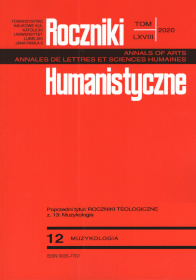Konstruktivismus und Intuition. Eine Analyse von Béla Bartóks Klavierstück Subject and Reflection aus dem Mikrokosmos
Abstrakt
Konstruktywizm i intuicja. Analiza utworu fortepianowego Béli Bartóka Tükröződés z VI tomu zbioru Mikrokosmos
Przedmiotem badań jest utwór fortepianowy Béli Bartóka: Tükrözödés z VI tomu zbioru Mikrokosmos. Autor analizując szczegółowo tę kompozycję, dowodzi, iż strukturalizm polifonii zaproponowany przez węgierskiego kompozytora i jej tonalne podłoże mają głębokie podłoże estetyczno-filozoficzne. Bartók poszedł własną drogą kompozytorską, na którą znaczny wpływ miało jego zainteresowanie folklorem. Na jego oryginalny język muzyczny złożyły się m.in. takie czynniki, jak: swobodne operowanie harmoniką, zwięzłość wypowiedzi muzycznej, właściwa melodiom i rytmom ludowym, a obca ekspresyjnej poetyce wykreowanej przez twórców XIX wieku, czy śmiałość w stosowaniu dysonansowych współbrzmień.
Konstruktivismus und Intuition. Eine Analyse von Béla Bartóks Klavierstück Subject and Reflection aus dem Mikrokosmos
Das Forschungsthema dieses Artikels ist ein Klavierstück von Béla Bartók: Subject and Reflection (Tükrözödés) aus dem 6. Band des Mikrokosmos. Der Komponist beweist, dass der Strukturalismus der Polyphonie und seine tonale Grundlage einen tiefen ästhetisch-philosophischen Grund haben. Bartók ist stilistisch seinen eigenen Weg gegangen, der maßgeblich von seinem Interesse an der Folklore beeinflusst wurde. Seine musikalische Sprache ist durch mehrere Faktoren geprägt, u.a.: freier Umgang mit der Harmonik, Prägnanz des musikalischen Ausdrucks, typisch für Volksmelodien und Volksrhythmen, der expressiven Poetik der Komponisten des 19. Jahrhunderts fremd sind, oder Mut in der Verwendung dissonanter Akkorde.
Bibliografia
Bárdos, Lajos. „Die volksmusikalischen Tonleitern bei Liszt.” Franz Liszt – Beiträge ungarischer Autoren, hrsg. von Klara Hamburger, Corvina, 1978, S. 168-196.
Bárdos, Lajos. „Die volksmusikalischen Tonleitern bei Liszt.” Franz Liszt – Beiträge ungarischer Autoren, hrsg. von Klara Hamburger, Corvina, 1978.
Bárdos, Lajos. Harmine ira’s. Zenemükiadó Vállalat, 1969.
Bárdos, Lajos. Modális harmóniák (Modale Harmonik). Kiadás éve, 1961.
Bartók, Béla. A magyar népdal (Das ungarische Volkslied). Rózsavölgyi és Társa, 1924.
Dahlhaus, Carl, u. Hans Heinrich Eggebrecht. Brockhaus-Riemann-Musiklexikon, Bd. 2, Schott, 1979.
Dahlhaus, Carl. Die Musik des 19. Jahrhunderts. Laaber Akademische Verlagsanstalt, 1980.
Engelmann, Hans Ulrich. Béla Bartóks „Mikrokosmos”: Versuch einer Typologie „Neuer Musik.” Triltsch, 1953.
Gárdonyi, Zoltán. „Neue Ordnungsprinzipien der Tonhöhen in Liszts Frühwerken.” Franz Liszt – Beiträge ungarischer Autoren, hrsg. von Klara Hamburger, Corvina, 1978, S. 226-273.
Gárdonyi, Zsolt, and Hubert Nordhoff. Harmonik. Möseler Verlag, 1990.
Haunschild, Frank. Die neue Harmonielehre, Bd. 1, AMA Verlag, 1988.
Lendvai, Ernö. Symmetrien in der Musik. Kodály Institut Kecskemét, 1995.
Lesznai, Lajos. Béla Bartók. Deutscher Verlag für Musik, 1967.
Lissa, Zofia. „Zur Genesis des „Prometheischen Akkords“ bei Alexandr Nikolajewitsch Skrjabin.” Musik des Ostens, Bd. 2, hrsg. von Johann-Gottfried-Herder-Forschungsstelle für Musikgeschichte, Bärenreiter, 1963, S. 170-183.
Persichetti, Vincent. Twentieth Century Harmony. W.W. Norton & Co, 1961.
Somfai, László. „Bartók.” Die Musik in Geschichte und Gegenwart, Personenteil, Bd. 2, hrsg. von Ludwig Finscher, Bärenreiter Metzler, 1999.
Szabolcsi, Bence, Hrsg. Béla Bartók, Weg und Werk. Corvina 1957/Bärenreiter 1972.
Uhde, Jürgen. Bartóks Mikrokosmos: Spielanweisungen und Erläuterungen. Gustav Bosse Verlag,1954.
von der Nüll, Edwin. Béla Bartók. Ein Beitrag zur Morphologie der neuen Musik. Mitteldeutsche Verlags-Aktien-Gesellschaft, 1930.
Copyright (c) 2020 Roczniki Humanistyczne

Utwór dostępny jest na licencji Creative Commons Uznanie autorstwa – Użycie niekomercyjne – Bez utworów zależnych 4.0 Międzynarodowe.





